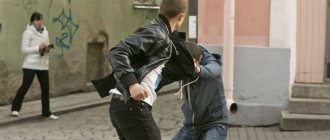ST 114 of the Criminal Code of the Russian Federation.
1. Intentional infliction of grievous harm to health, committed when exceeding the limits of necessary defense, is punishable by correctional labor for a term of up to one year, or restriction of freedom for a term of up to one year, or forced labor for a term of up to one year, or imprisonment for the same term. .
2. Intentional infliction of grievous or moderate harm to health, committed in excess of the measures necessary to detain the person who committed the crime, is punishable by correctional labor for a term of up to two years, or restriction of freedom for a term of up to two years, or forced labor for a term of up to two years. years, or imprisonment for the same period.
Permitted weapons for self-defense
How can you defend yourself if necessary? This question arises among many citizens of the Russian Federation. To answer, you need to turn to the federal law “On Weapons”.
Firearms
We are talking about smooth-bore hunting rifles. A license is required to purchase such weapons. A citizen can store a gun at home, in a specially designated place. Moreover, it is important that unauthorized persons do not have access to weapons.
You won’t be able to take a gun with you to the store for fear of being attacked by hooligans on the street.
Have a question for a lawyer? Ask now, call and get a free consultation from leading lawyers in your city. We will answer your questions quickly and try to help with your specific case.
Telephone in Moscow and the Moscow region: +7
Phone in St. Petersburg and Leningrad region: +7
Free hotline throughout Russia: 8 (800) 301-39-20
Firearms of limited destruction
These are traumatic pistols in which rubber bullets are used instead of traditional lead ones. It is also possible to use light and sound cartridges or gas. Such weapons only imitate a shot, creating a loud sound and a bright flash. In fact, we are talking about scarecrows.
Despite the fact that such weapons have low lethality, a license is required to purchase them. But you can take a gas pistol with you almost anywhere, excluding rallies, concerts, etc.
Gas cartridges and similar means
Mechanical sprayers containing tear and irritants fall into this category. No license is required to purchase and wear them. Every citizen over 18 years of age can purchase a can.
Such weapons are not capable of causing serious injury to the attacker. However, the irritating effect of pepper spray can only make the attacker angry.
Stun guns
Such devices are sold without a license. There are no powerful stun guns used by the police on the market. Also, for self-defense, you will not be able to buy a remote control device.
Household stun guns have relatively low power, and therefore they will not be effective against every criminal.
Other items
You can also use improvised means for self-defense. A kitchen knife, stone or stick is suitable for these purposes. A citizen can also carry a small folding knife. However, if he one day uses it for self-defense, he will need to explain how the item ended up in his pocket. In this case, we can say that the knife is usually used for cutting sausage, sharpening pencils, etc. The main thing is that it does not belong to the category of edged weapons.
It is also possible for a person to quarrel with a neighbor, come home to get a knife, and then continue to sort things out again. Such an explanation is unlikely to allow the defender to avoid punishment. The investigator may even decide that the person had direct intent and was going to use the knife. Accordingly, there can be no talk of any self-defense in this case.
The weapon of self-defense itself is not so important for the criminal process. A person can engage an opponent hand-to-hand, use a crowbar, a pistol, or even a grenade. And if the defender owned the weapon legally, then it does not matter how threatening it looked.
First of all, law enforcement officers will pay attention to the fact that the defense corresponded to the degree of threat. Thus, if a defender shoots an unarmed person, he is unlikely to escape punishment. Kicking an attacker armed with a knife is quite normal.
Responsibility by article
It also makes sense to mention the articles under which the court case will be held. If a person, while defending himself, deprived another of his life, then the most loyal article, the punishment under which he will ultimately serve, is the previously mentioned Article 108. The court, unfortunately, resorts to it quite rarely.
If self-defense and excess of its measures have not been proven, then the accused can be convicted under Article 105 of the Criminal Code of the Russian Federation “Murder”, the punishment for which is imprisonment from 6 to 15 years. There have been precedents when the accused was punished under Article 111 of the Criminal Code of the Russian Federation - intentional infliction of grievous harm, which is punishable by imprisonment for up to 8 years.
What to do if you are beaten on the street.
Better to avoid violence
To avoid problems with the law, parties to the conflict should do everything possible to avoid a fight. Any use of force can lead to fatal consequences. Therefore, if the victim can escape, then it is better to choose this option.
Self-defense can cost a person nerves, money and time. In addition, there is always a chance that the law will not be on your side. And then you will have to hire a lawyer, whose services are not cheap. And even in this case, there will be no guarantee that the person will be able to avoid punishment.
Criteria for assessing the legality of causing harm
At the legislative level, to clarify the provisions on self-defense, a Resolution of the Plenum of the Supreme Court was adopted, which specified the criteria for assessing the actions of the defender and the limits of self-defense. Below we will present the signs that are subject to assessment when deciding whether the limit is exceeded.
Object of a criminal act
The law enforcement officer must evaluate what the criminal act is aimed at. This could be the health or life of a person or his close relative. The object in some cases is dignity, property belonging to the person defending himself from attack.
Method of achieving a criminal goal by an attacker
The method involves the attacker using objects and means to achieve a criminal goal. These include:
- knives;
- heavy objects;
- weapon;
- other.
Severity of the expected consequences
The judge considering the criminal case must assess the nature of the assault, namely, whether it did or did not pose a real danger to the life or health of the defender or people close to him. Expressed or demonstrated threats of encroachment are also subject to assessment. Reality is assessed through the prism of actions committed by an attacker, for example, this could be injuries to vital organs and the like.
Important! If the defense was directed against an attack that is not associated with violence dangerous to the vital functions of the victim’s body, then if its limits are exceeded, it is considered unlawful.
Causing serious injury (death) to the offender
It is legal to cause death or serious harm to the attacker only if the criminal act involves dangerous violence.
The situation of causing harm to the attacker will be regarded as exceeding the limits of defense, despite the fact that the defender is aware of the possibility of not performing these actions in order to stop the attack. In this case, the responsibility established by criminal law is applied to the defendant.
Assessment of the circumstances of the attack
The place and time of the crime must be assessed.
In particular, if an attack is carried out at night, then it is considered more dangerous than what is committed during the day. In a deserted place, an illegal act is assessed as more dangerous than in a place where there are many people. The circumstances of the crime are also subject to assessment, including:
- circumstances preceding the attack;
- surprise or expectation for the defender;
- use of weapons by the attacker;
- number of criminals.
The ability of the defender to repel an attack
It is taken into account whether the defender could repel the attack, and gender, age, and state of health (both mental and physical) are assessed. The assessment is given to the listed criteria regarding the attacker and defender.
Additional features and nuances
If a person intentionally provokes another person to attack himself in order to use force and commit illegal acts, then these circumstances do not constitute necessary self-defense. They qualify on a general basis.
If the attack was unexpected, then the defender had no opportunity to assess the degree of danger. In such a situation, regardless of the victim’s actions, they will not exceed the necessary defense. The court will determine whether the attack was truly unexpected. To do this, he will find out all the circumstances and the emotional state of the victim at that time.
Experts have compiled a short reminder on what a person should do if he is attacked:
- if possible, you need to run away and hide, try to attract the attention of witnesses;
- if there is nowhere to run, you need to defend yourself, and for an attack it is recommended to use objects that the court will not be able to classify as weapons in the future (green paint, flour, pepper spray);
- if the attacker has a weapon, the victim has the right to use all possible methods of self-defense;
- if damage to life and health is caused by law enforcement officers, then the court may classify self-defense as resistance to these persons, so it will be necessary to find witnesses who will prove the unlawfulness of the attackers’ actions.
The person defending himself has the right to use “self-defense weapons” that do not require a license: pepper spray, weapons with traumatic or flash cartridges, gas sprayers, stun guns. But these types of weapons cannot be used against women, children, disabled people (and attackers if they have signs of disability), with the exception of protection from a group of attackers or if the criminals are armed.
After this, you need to immediately call an ambulance - this action will prove that the defender did not plan to harm the person. Then you should call the police, but it is advisable not to provide any evidence until the lawyer arrives.
Special cases
Judicial practice under Art. 114 of the Criminal Code of the Russian Federation contains many different situations when the necessary defense went beyond what was reasonable.
For example, one person approached another on the street and rudely tried to take away his personal belongings. In response, he was shot at point-blank range or stabbed, and then seriously injured after prolonged treatment. Sometimes such cases end in death. This option is quite common on the streets of large cities. People carry guns to ensure their own safety. But is such an extreme measure justified in this case? Of course not. This is what Part 1 of this article is about. The person may have tried to scare the attacker or easily injure him, but he intentionally committed unjustified actions that led to such consequences. Or, for example, a thief runs away with a stolen item, and the owner or an ordinary passer-by, wanting to help restore justice, kills him with a shot in the back. In this situation, Part 2 applies, when the arrest of the criminal was carried out in a dangerous and excessively cruel way. Both cases have one feature: people, in defending themselves, crossed a fine line when anger allowed them to forget about justice.
The line between murder (causing serious injury), defense and exceeding the limits of defense
When deciding whether to exceed defense limits, some points need to be taken into account:
- If the attacker causes death or serious harm to health, provided that his criminal actions did not create a threat to the health and life of the defender, the latter is held accountable in accordance with the provisions of the Criminal Code.
- When a criminal uses a weapon or other dangerous objects, and the defender perceives a real threat to himself, he needs to minimize the consequences of the defense in order to avoid punishment.
- If, after the defender has committed actions, there are no grounds for fear, he must stop defending.
- When a crime involves violence dangerous to life or health, the legislator gives the defender the right to cause harm of any severity to the perpetrator.
Corpus delicti
As already mentioned, a crime under Article 108 of the Criminal Code of the Russian Federation will be committed when a person commits actions that will be considered an excess of necessary self-defense. For a clearer understanding of such a concept as necessary self-defense, it is worth referring to Resolution of the RF Armed Forces No. 19.
- Firstly, the means of self-defense must be consistent with those used by the attacker . For example, using a bladed weapon against a person who used only his physical strength will be regarded as violating the boundaries of what is permitted for self-defense (and this is at best).
- Secondly, the threat to health and life must be quite significant , taking into account the fact that the Resolution separately stipulates this nuance: it does not matter what skills and what physical training the victim has. An attack with a knife is a significant threat both to an ordinary person and to someone who has taken special self-defense courses.
- Thirdly, a violation of the norms of self-defense is also when the attacker no longer poses any threat (stunned, immobilized, or simply calmed down), and the victim continues to “defend” himself, causing additional damage to the person.
- Fourthly, self-defense is not such if a person was the first to go into conflict, provoking the attacker .
- Fifthly, the law allows the deprivation of the life of an aggressor only if it was the last resort to save one’s own life . Otherwise, the court will consider it not as an excess of self-defense, but as murder.
These were the most basic provisions of permissible self-defense measures and, therefore, possible violations of it. Of course, every case is individual, and it is impossible to take everything into account at once. Let's talk in more detail about murder in self-defense, or more precisely about what comes after it.
What to do if a child is beaten at school?
Basic information
If the life, health or property of a person and/or his loved ones is in danger from a criminal, then the victim can use self-defense measures. The Constitution of the Russian Federation guarantees every citizen of Russia the right to self-defense.
According to Art. 37 of the Criminal Code of the Russian Federation , if the defender caused harm to the attacker’s well-being, then criminal liability does not arise. However, it is necessary to prove that the victim committed acts of self-defense when something really threatened her well-being and life. Otherwise, there is a risk that the right to self-defense will be abused.
Necessary self-defense is a person’s protection of his health, life, if the attack on him was accompanied by life-threatening violence or with an immediate threat of this violence. In this case, there is a risk of avoiding criminal liability, even if the attacker died.
Life-threatening violence – causing damage to well-being that threatens life. For example, the attacker injured the victim’s vital organs, used a weapon, choked the victim, or started an arson.
An immediate threat of violence is the perpetrator's words and statements that he plans to kill or seriously harm the victim. Also, an immediate threat includes the display of weapons if there is reason to fear that the threat will be carried out.
What is necessary defense
The article of the Criminal Code of the Russian Federation for murder in self-defense provides for punishment for causing more harm to the criminal than he could have caused to the victim. The amount of punishment is determined by the judge who considers the criminal case in each specific case individually, based on the circumstances of the crime.
Article 114 of the Criminal Code talks about necessary defense. According to the explanations of the Plenum of the Supreme Court, defense will be considered necessary in the case when a person repels an attack by a criminal. The assault must not involve violence that is dangerous to life or health. The necessary defense arises not only from the moment the crime begins, but there is also a threat that the perpetrators will proceed to attack. In such a situation, the court must assess the reality of the threat.
Download for viewing and printing:
Article 105. Murder of the Criminal Code of the Russian Federation
Article 114. Causing grievous or moderate harm to health when exceeding the limits of necessary defense of the Criminal Code of the Russian Federation






